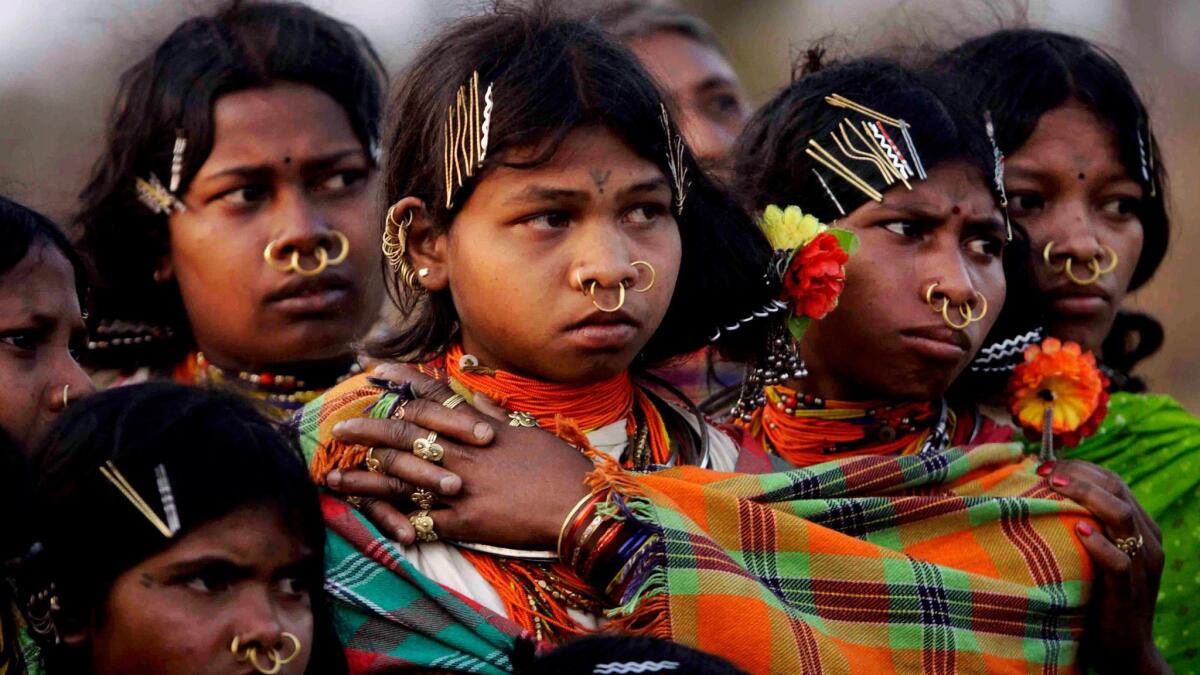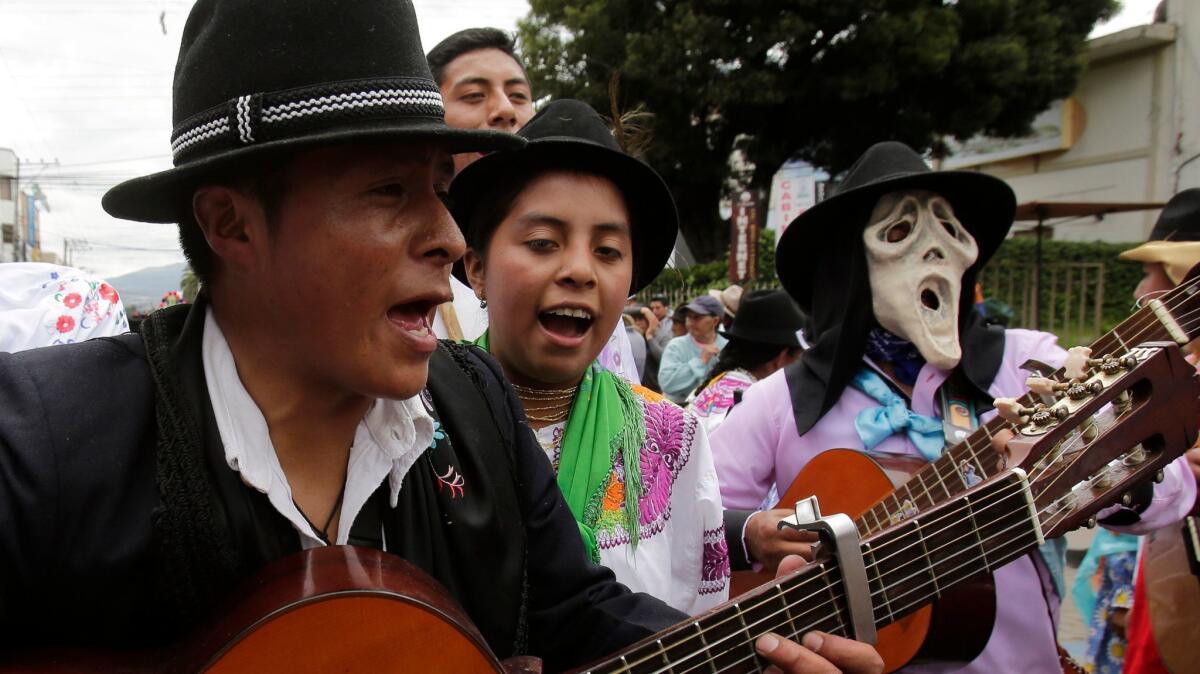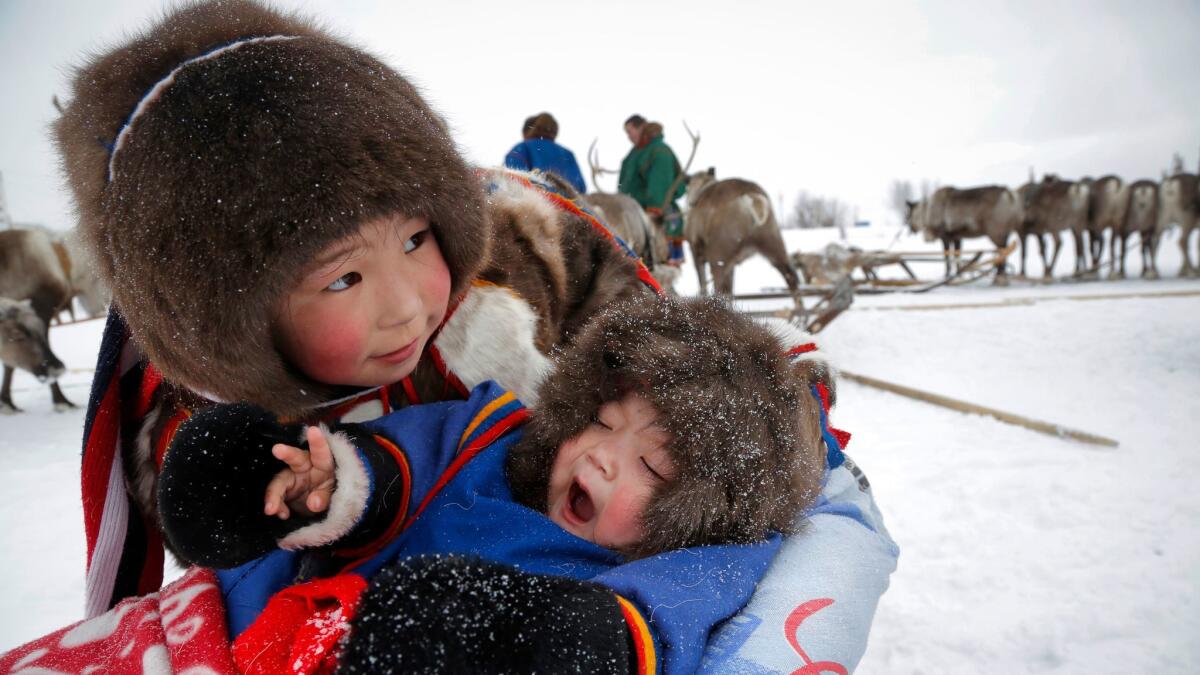Opinion: Celebrating indigenous peoples and how they gained a voice on the world stage

- Share via
As the International Day of the World’s Indigenous Peoples is observed on Wednesday, it will celebrate the achievements of advocates, leaders and native nations whose efforts helped indigenous peoples become a permanent part of the international community and underscore the importance of their participation in politics.
On this day 35 years ago, indigenous leaders were given the opportunity to participate in United Nations efforts to develop standards to advance and defend the human rights of indigenous peoples.
The U.N. estimates that indigenous communities account for more than 370 million people who live across 90 countries, and speak a majority of the world’s languages. In legal terms, indigenous communities are distinguished from other minorities in that they are recognized as the only cultural groups with the right to self-determination. This allows them to claim autonomy from their states’ governments.
Advocacy by indigenous people on the world stage can be traced to 1923 when Chief Deskaheh of the Cayuga Native American tribe traveled to Geneva to address the League of Nations on the rights of the Haudenosaunee, a powerful American Indian alliance. He was prohibited from entering plenary sessions.
Other indigenous leaders from New Zealand, Australia and the Americas followed Chief Deskaheh’s path, and received similar treatment. The evolution of the League of Nations into the United Nations in 1945 did not significantly change the situation. In the 1950s, the international community considered indigenous issues as primarily the problems of “undeveloped” societies. In 1957, the first convention addressing the rights of indigenous populations was adopted to assist U.N. members with integrating their “problematic” indigenous populations.
Indigenous politicians in the Nordic states, New Zealand and Australia not only resisted such efforts in their home countries, they reached out to native peoples beyond their borders to create an international movement. Under the leadership of the North American native leaders, the World Council of Indigenous Peoples was created in 1975, and became the first international body representing the rights of indigenous peoples in the global arena.
The council gained status as a nongovernmental organization, affiliated with the U.N. as a civil society partner. This position allowed the council’s members to observe meetings of the U.N.’s Working Group on Indigenous Populations and offer expert advice. Since then, the number of native leaders, activists and scholars supporting indigenous causes at the Working Group has mushroomed from fewer than 15 in 1982-83 to more than 400 by 1993.
Thirty-five years is a relatively short period given the centuries-long history of violence against indigenous communities. The unprecedented changes that indigenous politics produced in the legal treatment of native populations and to the U.N. system, over such a limited stretch, makes indigenous advocacy an astounding political phenomenon.
Today, indigenous politicians influence policymaking in most areas of social and economic development at the U.N. Their advocacy is particularly prominent in the area of environmental protection. The growing network of more than 40 intergovernmental agencies promotes indigenous rights and supports indigenous political participation through policy and projects that allow them to strengthen the skills, development and resources of their communities.
The approach includes mechanisms that provide U.N. agencies with expertise and advice on the rights of indigenous peoples and allows for the allocation of funding to assist representatives of such communities and organizations to participate in working group deliberations. A special rapporteur has also been assigned to monitor the overall human rights situations of communities in selected countries and address cases of alleged violations.
And the U.N. Permanent Forum on Indigenous Issues is the first body within the system of the intergovernmental organization to provide membership and voice to indigenous politicians. This September the world will celebrate the 10th anniversary of the United Nations Declaration on the Rights of Indigenous Peoples, the first document in international law history created with the participation of indigenous leaders.
Different communities have succeeded in using these mechanisms to make change in their home countries. For example, many Latin American governments now recognize indigenous communities’ right to self-determination. Colombia, Peru, Bolivia and Ecuador went as far as to accept indigenous jurisdictions and laws that govern long-established customs and practices.

The endorsement of the United Nations Declaration on the Rights of Indigenous Peoples by the United States and Canada, in 2010 and 2016 respectively, established the intention of both governments to treat Indian nations in accordance with the declaration’s norms, and recognized their right to nation-building and self-determination based on their own cultural and social norms.
This year saw the adoption of the Nordic Saami Convention, which commits three Nordic states to support the rights of Saami people across borders.
Inspiring development is even happening in states that have a record of human rights abuses. In Russia, human rights bodies help indigenous peoples to engage the support of the international community in their resistance, while providing a safe space to conduct official negotiations. This was the experience of the Crimean Tatars who, following Russia’s annexation of Crimea from Ukraine in 2014, lost their indigenous status and the right to self-governance on their ancestral lands.
In Africa, where most governments continue to deny the relevance of indigenous rights, transnational indigenous rights networks have provided leaders with opportunities to express their grievances and tools to support their communities. International efforts helped to stop the forceful relocation the San people of Botswana’s Central Kalahari in 2006. The Maasai of Tanzania have been able to revitalize and preserve their cultural heritage and support women rights with the help of U.N. agencies, while the Mbororo of Cameroon created NGOs, such as Laimaru Network, to educate their communities in the rights of indigenous peoples.
Indigenous politics represent some of the most advanced developments of our time, despite the ironic stereotype of native communities being viewed as “vanishing peoples.”

While indigenous leaders can claim autonomy from their home states, they recognize that their communities share a common history and concerns with the population of those states. Most of them aim to wield greater influence over matters that specifically impact their people, such as environmental protection and education and the economy, while contributing to solving global problems, like climate change.
Critics warn that this approach reinforces the incorporation of indigenous communities into the fabric of their states. This is true, but at the same time, the changes to the international system indicate a shift toward supporting a multicultural order that can accommodate the political wants of indigenous peoples and other minorities.
Ultimately, indigenous politicians want the world community to realize that to live in peace is to share the world together by accommodating each other, rather than assimilating the weaker. This idea goes back to indigenous teachings that assert that no nation or state can claim absolute sovereignty because the universe does not exist to accommodate an exclusive place for one group at the expense of others. The universe is a system of cosmic relations, where each community of people, plants, animals and other beings has its own purpose within the larger order. To live together is to respect this wisdom by living in harmony with others.
Ulia Gosart is a lecturer in the Department of Information Studies at UCLA. She has been an indigenous rights advocate for more than a decade, working closely with activists and scholars from the former Soviet Union and North America.
More to Read
Sign up for Essential California
The most important California stories and recommendations in your inbox every morning.
You may occasionally receive promotional content from the Los Angeles Times.













